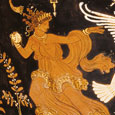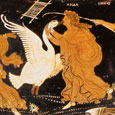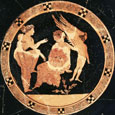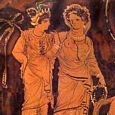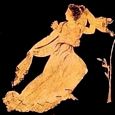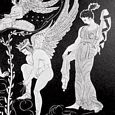PEITHO
Greek Name
ΠειΘω
Transliteration
Peithô
Roman Name
Suada, Suadela
Translation
Persuasion (peithô)
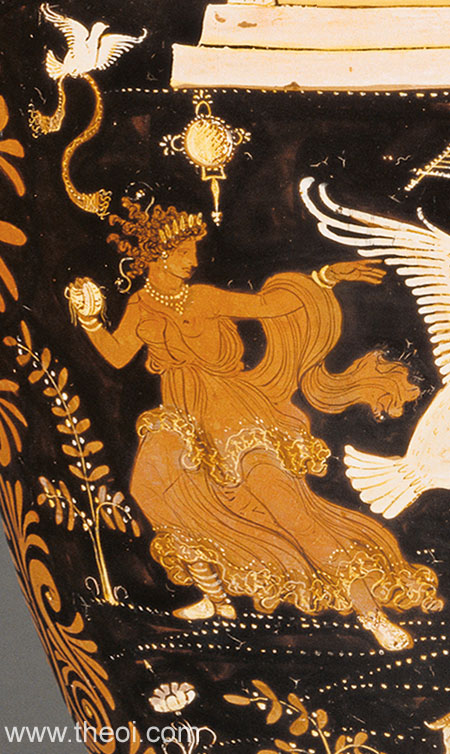
PEITHO was the goddess or personified spirit (daimona) of persuasion, seduction and charming speech. She was a handmaiden and herald of the goddess Aphrodite.
Peitho was usually depicted as a woman with her hand raised in the act of persuasion or fleeing from the scene of a rape. Her attributes were a ball of twine and a dove.
FAMILY OF PEITHO
PARENTS
[1] OKEANOS & TETHYS
(Hesiod Theogony 349)
[2] APHRODITE (Sappho Frag 96, 200, Aeschylus
Suppliant Women 1039)
[3] PROMETHEUS (Alcman Frags 3 &
64)
[4] ATE (Aeschylus Agamemnon 385)
OFFSPRING
[1] HYGEIA (by Eros) (Orphic Rhapsodies Frag)
[2] IYNX (Suidas s.v. Iynx)
[3] AIGIALEUS, APIA (by Phoroneus) (Scholiast on Euripides' Orestes 920)
ENCYCLOPEDIA
PEITHO (Peithô). 1. The personification of Persuasion (Suada or Suadela among the Romans), was worshipped as a divinity at Sicyon, where she was honoured with a temple in the agora. (Herod. viii. 11; Paus. ii. 7. § 7.) Peitho also occurs as a surname of other divinities, such as Aphrodite, whose worship was said to have been introduced at Athens by Theseus, when he united the country communities into towns (Paus. i. 22. § 3), and of Artemis (ii. 21. 1). At Athens the statues of Peitho and Aphrodite Pandemos stood closely together, and at Megara, too, the statue of Peitho stood in the temple of Aphrodite (Paus. i. 43. § 6), so that the two divinities must he conceived as closely connected, or the one, perhaps, merely as an attribute of the other. 2. One of the Charites. (Paus. ix. 35. § 1 ; Suid. s. v. Charites.) 3. One of the daughters of Oceants and Thetis. (Hes. Theog. 349.) 4. The wife of Phoronens, and the mother of Aegialeus and Apia. (Schol. ad Eurip. Orest. 920.)
Source: Dictionary of Greek and Roman Biography and Mythology.
CLASSICAL LITERATURE QUOTES
PARENTAGE & CHILDREN OF PEITHO
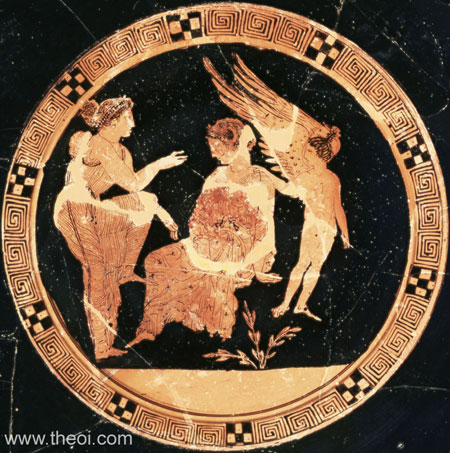
Hesiod, Theogony 346 ff (trans. Evelyn-White) (Greek epic C8th or C7th B.C.)
:
"She [Tethys] brought forth also a race apart of daughters, who with lord Apollon and the Potamoi (Rivers)
have the young in their keeping all over the earth, since this right from Zeus is given them. They are Peitho
(Persuasion), Admete, Ianthe [in a list of names] . . . Now these are the eldest of the daughters who were born
to Tethys and Okeanos (Oceanus)."
Sappho, Fragment 96 (trans. Campbell, Vol. Greek Lyric I) (Greek lyric C6th B.C.)
:
"Nursling of Kytherea (Cytherea) [Aphrodite], but elsewhere she calls Peitho a daughter of Aphrodite."
Sappho, Fragment 200 :
"Sappho says Peitho, was the daughter of Aphrodite."
Pausanias, Description of Greece 9. 35. 1 :
"The elegiac poet Hermesianax [C4th B.C.] disagrees with his predecessors in that he makes Peitho one of
the Kharites (Charites, Graces)."
Suidas s.v. Iynx (trans. Suda On Line) (Byzantine Greek Lexicon C10th A.D.)
:
"Iynx [nymph of a magic love-charm] . . . was the daughter of Ekho (Echo), some [say] of Peitho
(Persuasion)."
PEITHO GODDESS OF PERSUASION
Pindar, Pythian Ode 4. 217 ff (trans. Conway) (Greek lyric C5th B.C.) :
"And the goddess [Aphrodite] made plain to Aison's (Aeson's) son [Jason] the lore of prayers, and spells of
magic incantation, that he might rob Medea's heart . . . driving her with Peitho's (Seduction's) lash."
Pindar, Pythian Ode 9. 40 ff :
"Secret, great Phoibos (Phoebus) [Apollon], are the keys of wise Peitho (Seduction) to love's true
sanctities."
Pindar, Nemean Ode 8. 1 ff :
"O sovereign Peitho (Seduction), herald of Aphrodite."
Pindar, Eulogies Fragment 122 (trans. Sandys) (Greek lyric C5th B.C.) :
"Guest-loving girls [courtesans and prostitutes]! Servants of Peitho (Suasion) in wealthy Korinthos
(Corinth)! Ye that burn the golden tears of fresh frankincense, full often soaring upward in your souls unto
Aphrodite."
Pindar, Eulogies Fragment 123 :
"I ween that even in Tenedos Peitho (Suasion) and Kharis (Charis, Charm) dwelt in the soul of the son of
Hageslias."
Alcman, Fragment 64 (trans. Campbell, Vol. Greek Lyric II) (Greek lyric C7th B.C.)
:
"Tykhe (Tyche, Fortune) sister of Eunomia (Good Order) and Peitho (Persuasion) the daughter of Prometheus
(Forethought)."
Anacreon, Fragment 384 (trans. Campbell, Vol. Greek Lyric II) (Greek lyric C6th B.C.)
:
"And in those days Peitho (Persuasion) did not yet shine all silver." [N.B. The poet means the only
way to persuade people now is with a monetary bribe.]
The Anacreontea, Fragment 16 (trans. Campbell) (Greek lyric C5th or C4th B.C.)
:
"Paint her lips like Peitho's (Seduction's) provoking kisses."
Ibycus, Fragment 288 (trans. Campbell, Vol. Greek Lyric III) (Greek lyric C6th B.C.)
:
"The Kyprian (Cyprian) [Aphrodite] and soft-lidded (aganoblepharos) Peitho nursed you [a charming
boy] among rose-blossoms."
Ibycus, Fragment 288 :
"Euryalos, offshoot of the blue-eyed Kharites (Charites, Graces), darling of the lovely-haired Horai
(Horae, Seasons), Kypris (Cypris) [Aphrodite] and soft-lidded Peitho (Persuasion) nursed you among
rose-blossoms."
Aeschylus, Agamemnon 104 ff (trans. Weir Smyth) (Greek tragedy C5th B.C.)
:
"[Chorus of elders:] I have the power to proclaim the augury of triumph given on their way to
princely men--since my age still breathes Persuasion [peitho, lower case, but represented as a divine
force] upon me from the gods, the strength of song."
Aeschylus, Agamemnon 385 ff :
"Perverse Temptation (talaina peithô), the overmastering child of designing Destruction
(atê), drives men on; and every remedy is futile. His evil is not hidden; it shines forth, a
baleful gleam . . . Such was Paris, who came to the house of the sons of Atreus [i.e. Menelaus] and dishonoured
the hospitality of his host by stealing away a wedded wife [Helene]."
Aeschylus, Eumenides 885 ff :
"Give holy reverence to Peitho (Persuasion), the sweetness and charm of my tongue, then you might
remain."
Aeschylus, Eumenides 969 ff :
"I am grateful to Peitho (Persuasion), that her glance kept watch over my tongue and mouth, when I
encountered their fierce refusal . . . Our rivalry in doing good is victorious forever."
Aeschylus, Libation Bearers 723 ff :
"[Orestes uses guile and stealth to obtain victory over his father's murderers :] Now is the hour for
Peitho (Persuasion) with her guile to join forces with him [Orestes], and for Hermes Khthonios (Chthonius, of
the netherworld), who works in stealth, to direct this encounter of the deadly sword."
Aeschylus, Prometheus Bound 173 ff :
"Not by persuasion's (Peitho's) honeyed enchantments will he charm me; I will never . . . divulge this
secret."
Aeschylus, Suppliant Women 1035 ff :
"She [Aphrodite], together with Hera, holds power nearest to Zeus [as gods of marriage], and for her solemn
rites the goddess of varied wiles is held in honor. And in the train of their mother are Pothos (Desire) and she
to whom nothing is denied, winning Peitho (Persuasion); and to Harmonia (Harmony) has been given a share of
Aphrodite, and to the whispering touches of the Erotes (Loves)."
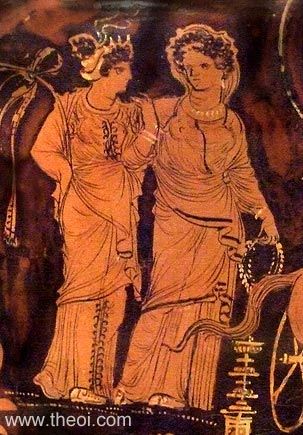
Aeschylus, Fragment 82 Niobe (from Stobaeus, Anthology 4. 51. 1) :
"For, alone of gods, Thanatos (Death) loves not gifts; no, not by sacrifice, nor by libation, canst thou
aught avail with him; he hath no altar nor hath he hymn of praise; from him, alone of gods, Peitho (Persuasion)
stands aloof."
Aristophanes, Frogs 1360 (trans. O'Neill) (Greek comedy C5th to 4th B.C.)
:
"Euripides : ‘Peitho's (Persuasion's) only shrine is eloquent speech.’"
Herodotus, Histories 8. 111. 1 (trans. Godley) (Greek historian C5th B.C.)
:
"Themistokles (Themistocles) [the historical general who led the Greek defense against the Persians] gave
them [the people of Andros] to understand that the Athenians had come with two great gods to aid them, Peitho
(Persuasion) and Ananke (Necessity), and that the Andrians must therefore certainly give money, they said in
response, 'It is then but reasonable that Athens is great and prosperous, being blessed with serviceable gods.
As for us Andrians, we are but blessed with a plentiful lack of land, and we have two unserviceable gods who
never quit our island but want to dwell there forever, namely Penia (Poverty) and Amekhania (Helplessness).
Since we are in the hands of these gods, we will give no money; the power of Athens can never be stronger than
our inability."
Pausanias, Description of Greece 5. 11. 8 (trans. Jones) (Greek travelogue C2nd A.D.)
:
"[Amongst the images decorating the throne of Zeus in the temple at Olympia :] Eros (Love) receiving
Aphrodite as she rises from the sea, and Aphrodite is being crowned by Peitho (Seduction)."
Plutarch, Life of Themistocles 21. 1 (trans. Perrin) (Greek historian C1st to C2nd
A.D.) :
"He [the Athenian statesman Themistokles (Themistocles)] made himself hateful to the allies also, by
sailing round to the islands and trying to exact money from them. When, for instance, he demanded money of the
Andrians, Herodotos says he made a speech to them and got reply as follows: he said he came escorting two gods,
Peitho (Persuasion) and Bia (Compulsion); and they replied that they already had two great gods, Penia (Penury)
and Aporia (Powerlessness), who hindered them from giving him money."
Orphic Hymn 55 to Aphrodite (trans. Taylor) (Greek hymns C3rd B.C. to 2nd A.D.)
:
"[Aphrodite] source of Peitho (Persuasion), secret, favouring queen, illustrious born, apparent and
unseen."
Philostratus the Elder, Imagines 1. 17 (trans. Fairbanks) (Greek rhetorician C3rd
A.D.) :
"[From a description of an ancient Greek painting depicting Pelops in the suitors' race for Hippodameia :]
Look at the horse of Pelops, how white they are, obedient to the rein, comrades as they are of Peitho
(Persuasion), neighing gently and as if aware of the coming victory."
Philostratus the Younger, Imagines 4 (trans. Fairbanks) (Greek rhetorician C3rd A.D.)
:
"[From a description of an ancient Greek vase painting :] The river Akheloios (Achelous), my boy, in love
with Deianeira the daughter of Oineos (Oeneus), presses for the marriage; and Peitho (Persuasion) has no part in
what he does, but by assuming now one and now another of the shapes we see here, he thinks to frighten
Oineos."
[N.B. Peitho (Persuasion) has no part in forced marriage or violent union and so, in Greek art, she is depicted
fleeing the scene of a rape.]
Colluthus, Rape of Helen 28 ff (trans. Mair) (Greek poetry C5th to C6th A.D.)
:
"[Attendance of the wedding of Peleus and Thetis :] Nor did the queen of harmony herself, even Aphrodite,
loiter in coming to the groves of the Kentauros (Centaur) [Kheiron (Chiron)]. Came also Peitho (Seduction),
having fashioned a bridal wreath, carrying the quiver of archer Eros (Love)."
Nonnus, Dionysiaca 3. 84 ff (trans. Rouse) (Greek epic C5th A.D.) :
"As he [Kadmos (Cadmus) on the island of Samothrake] was going towards Harmonia's house, he was met by
Peitho (Seduction), Lady of the bride-chamber. She had the form of a mortal woman, and like a household drudge,
she carried a weight pressed against her bosom by her arm, a rounded silver jug which she had filled with drink
from the spring: a presage of things to come, since they drench the bridegroom by time-honoured custom with
life-giving water in the bath before the marriage. He was now close by the city . . . Peitho covered Kadmos with
a dark mist from heels to head, and led him through the unseeing city in search of the king's hospitable hall,
guiding his way by the Paphian's [Aphrodite's] command. There some bird, perched under the delicate shadow of a
gray olive-tree,--it was a crow, she opened her loud beak inspired, and reproached the young man for a laggard,
that the bridegroom walked to his bride Harmonia with dawdling foot. She flapt her wings and rallied him soundly
: ‘So Kadmos is a baby, or only a novice in love! Eros (Love) is a quick one, and knows nothing of slow
bride-grooms! Forgive me, Peitho--your Kadmos dallies, Aphrodite is in haste! Hot Eros (Love) calls you,
bridegroom--you plod along like a laggard, and why? . . . Peitho is your guide, not Artemis, Peitho the friend
of marriage, the nurse of the baby Erotes (Loves) . . . ’
Kadmos walked along the winding highroad; and when the king's allhospitable court came into view, far-seen upon
its lofty pillars, Peitho pointed a finger to indicate the corresponding words in her mind, and by this
voiceless herald showed the house of shining artistry: then the divinity in another shape rose into the sky,
shooting through it with winged shoe."
Nonnus, Dionysiaca 8. 220 ff :
"If quikshoe Hermes has made merry bridal with you, if he has forgotten his own Peitho (Persuasion)."
[N.B. Here Peitho is the wife of Hermes.]
Nonnus, Dionysiaca 10. 278 ff :
"A Satyros (Satyr) saw the boy, and enchanted with his divine beauty he whispered, concealing his
words--‘Allfriendly Peitho (Seduction), manager of the human heart! Grant only that this lovely boy be
gracious to me!’"
Nonnus, Dionysiaca 24. 261 ff :
"[When Aphrodite entered a contest against Athena in weaving :] Pasithea made the spindle run round, Peitho
(Persuasion) dressed the wool, Aglaia (Aglaea) gave thread and yarn to her mistress. And weddings went all
astray in human life."
Nonnus, Dionysiaca 25. 150 ff :
"[Minos won his war against King Nisos of Megara with the help of the gods of love who made the king's
daughter betray her own father out of love for Minos :] Kypris (Cypris) [Aphrodite] wore a gleaming helmet, when
Peitho (Seduction) shook a brazen spear and turned into Pallas Athena to stand by Minos in the fray."
Nonnus, Dionysiaca 33. 112 ff :
"[Aglaia (Aglaea) summons Eros (Love) to come assist Aphrodite in matters of love :] ‘Allvanquisher
unvanquished, preserver of life coeval with the universe, make haste! Kythereia (Cytherea) [Aphrodite] is in
distress. None of her attendants has remained with her; Kharis (Charis, Grace) has gone, Peitho (Seduction) has
vanished, Pothos (Sexual Longing) the inconstant has left her; she had none to send but me. She needs your
invincible quiver!’"
Nonnus, Dionysiaca 41. 250 ff :
"The girl uttered her voice trickling sweeter than honey and honeycomb, winning Peitho (Persuasion) sat
ever upon her lips and enchanted the clever wits of men whom nothing else could charm."
Nonnus, Dionysiaca 42. 530 ff :
"Peitho (Seduction) the handmaid of marriage."
Nonnus, Dionysiaca 48. 106 ff :
"[Dionysos wrestles the Thrakian princess Pallene to win her hand in marriage :] Kypris (Cypris)
[Aphrodite] presided over the ring. In the midst was Eros (Love) naked, holding out to Bakkhos [Dionysos] the
bridal wreath. Wrestling was to win the bride: Peitho (Seduction) clad her delicate body in a silvery robe,
foretelling victory for Lyaios's (Lyaeus') [Dionysos'] wooing."
Nonnus, Dionysiaca 48. 230 ff :
"Lord Hermes of the ring . . . entered the delicate bed of Peitho (Persuasion) who brings marriage to
pass." [N.B. Peitho is here the wife of Hermes, god of eloquence.]
Nonnus, Dionysiaca 48. 593 ff :
" [Dionysos sought to seduce Aura by making her drunk with a spring of wine :] When she [Aura] saw the
deceitful fountain of Bakkhos (Bacchus), Peitho (Seduction) dispersed the shadowy cloud from her eyelids, and
called out to Aura like a herald of her marriage--‘Maiden, come this way! Take into your lips the stream
of this nuptial fountain, and into your bosom a lover.’
Gladly the maiden saw it, and throwing herself down before the fountain drew in the liquid of Bakkhos with open
lips."
CULT OF PEITHO
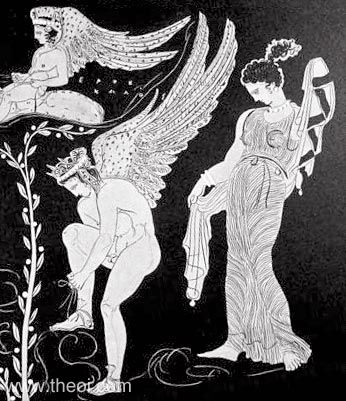
I. ATHENS Chief City of Attica (Southern Greece)
Pausanias, Description of Greece 1. 22. 3 (trans. Jones) (Greek travelogue C2nd A.D.)
:
"When Theseus had united into one state the many Athenian parishes, he established the cults of Aphrodite
Pandemos (Popular) and Peitho (Persuasion) [at Athens]. The old statues no longer exist, but those I saw were
the work of no inferior artists."
II. MEGARA Town in Attica (Southern Greece)
Pausanias, Description of Greece 1. 43. 6 :
"[Statues in the temple of Aphrodite at Megara :] There is also Peitho (Persuasion) and another goddess
whom they name Paregoros (Consoler), works of Praxiteles."
III. SICYON (SIKYON) Chief Town of Sicyonia (Southern Greece)
Pausanias, Description of Greece 2. 7. 7 :
"Within the market-place [of Sikyon (Sicyon)] is a sanctuary of Peitho (Persuasion); this too has no image.
The worship of Peitho was established among them for the following reason. When Apollon and Artemis had killed
Pytho they came to Aigialeia (Aegialea) to obtain purification. Dread coming upon them at the place now named
Phobos (Fear), they turned aside to Karmanor (Carmanor) in Krete (Crete), and the people of Aigialeia wer
smitten by a plague. When the seers bade them propitiate Apollon and Artemis, they sent seven boys and seven
maidens as suppliants to the river Sythas. They say that the deities were persuaded by these, came to what was
then the citadel, and the place that they reached first is the sanctuary of Peitho (Persuasion)."
IV. ARGOS Chief Town of Argolis (Southern Greece)
Pausanias, Description of Greece 2. 21. 1 :
"Having turned again to the market-place [of Argos], we come to the memorial of Kerdo (Cerdo, the Wily One)
[perhaps Peitho], the wife of Phoroneus, and to a temple of Asklepios (Asclepius). The [nearby] sanctuary of
Artemis, surnamed Peitho (Persuasion) [or perhaps a temple to both Artemis and Peitho], is another offering of
Hypermnestra after winning the trial to which she was brought by her father because of Lynkeus
(Lynceus)."
[N.B. The Scholiast on Euripides' Orestes says Peitho was the wife of Phoroneus, the first king of
Argos and Sikyon, and the mother of his successors Aigialeos (Aegialeus) and Apis. This may explain why she was
worshipped in the two towns. She was similar to Harmonia (Harmony),
goddess-daughter of Aphrodite, in this respect who was represented as the first queen of Thebes.]
ANCIENT GREEK ART
SOURCES
GREEK
- Hesiod, Theogony - Greek Epic C8th - 7th B.C.
- Pindar, Fragments - Greek Lyric C5th B.C.
- Greek Lyric I Alcman, Fragments - Greek Lyric C7th B.C.
- Greek Lyric I Sappho, Fragments - Greek Lyric C6th B.C.
- Greek Lyric II Anacreon, Fragments - Greek Lyric C6th B.C.
- Greek Lyric II Anacreontea, Fragments - Greek Lyric C5th - 4th B.C.
- Greek Lyric III Ibycus, Fragments - Greek Lyric C6th B.C.
- Aeschylus, Agamemnon - Greek Tragedy C5th B.C.
- Aeschylus, Eumenides - Greek Tragedy C5th B.C.
- Aeschylus, Libation Bearers - Greek Tragedy C5th B.C.
- Aeschylus, Prometheus Bound - Greek Tragedy C5th B.C.
- Aeschylus, Suppliant Women - Greek Tragedy C5th B.C.
- Aeschylus, Fragments - Greek Tragedy C5th B.C.
- Aristophanes, Frogs - Greek Comedy C5th - 4th B.C.
- Herodotus, Histories - Greek History C5th B.C.
- Pausanias, Description of Greece - Greek Travelogue C2nd A.D.
- Plutarch, Lives - Greek Historian C1st - 2nd A.D.
- The Orphic Hymns - Greek Hymns C3rd B.C. - C2nd A.D.
- Philostratus the Elder, Imagines - Greek Rhetoric C3rd A.D.
- Philostratus the Younger, Imagines - Greek Rhetoric C3rd A.D.
- Nonnus, Dionysiaca - Greek Epic C5th A.D.
- Colluthus, The Rape of Helen - Greek Epic C5th - 6th A.D.
BYZANTINE
- Suidas, The Suda - Byzantine Greek Lexicon C10th A.D.
OTHER SOURCES
Other references not currently quoted here: Suidas s.v. Charites, Horace Ep. 1.6.38, Cicero Brut. 15, et. al.
BIBLIOGRAPHY
A complete bibliography of the translations quoted on this page.
